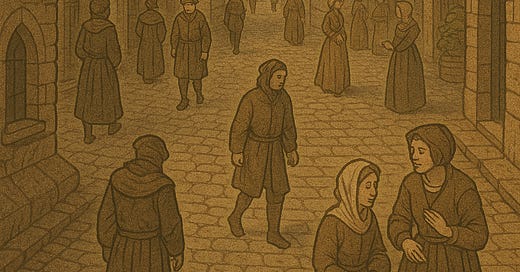Back in grad school—during a particularly caffeine-fueled seminar with a bunch of other Shakespeare nerds and one particularly smug professor of dramaturgy and art history (who wore tweed unironically)—we dove into Measure for Measure, one of Shakespeare’s most frustratingly fascinating plays. And in that swamp of morality, sex, punishment, and virginity, one character really lit a fire under me: Angelo.
You know, Angelo—the sanctimonious deputy who says, “No sex for anybody or it’s straight to the chopping block,” and then immediately catches feelings (and something else) for the first woman who asks him to chill out. Most people see him as the play’s villain: a pervy hypocrite with a judge complex. But I argued—loudly, and possibly while holding a bagel—that he’s not evil. He’s just really, really confused. Like, horny-confused. And morally constipated.
Let’s break it down: the Duke peaces out of Vienna (disguised, of course, because Shakespeare), and leaves Angelo in charge to clean up the city’s moral decay. Angelo, being a full-time killjoy and part-time nun-fantasizer, decides to actually enforce a law that makes premarital sex punishable by death. Harsh? Yes. Legal? Technically.
So he throws Claudio in jail for knocking up Juliet (no, not that Juliet), and then along comes Isabella—Claudio’s sister, a wannabe nun with the moral rigidity of a granite countertop. She begs for her brother’s life, and Angelo, in an incredible moment of Freudian freefall, gets turned on by her virtue. Like, hard. This guy basically looks at chastity and hears Marvin Gaye.
Then he makes the offer: “Sleep with me, and your brother lives.” Dude. DUDE.
But here’s the thing—this isn’t some mustache-twirling evil. This is a guy whose brain short-circuits when his worldview slams headfirst into his libido. Angelo is not plotting world domination. He’s not Iago. He’s just a repressed bureaucrat who suddenly finds himself in the middle of a high-stakes episode of The Bachelorette where the rose is someone’s virginity.
In his soliloquies, Angelo practically begs for therapy:
“What’s this? What’s this? Is this her fault or mine?
The tempter or the tempted, who sins most?”
This isn’t villain-speak. This is “I-need-to-talk-to-my-therapist-Rhonda-about-this-before-I-spiral” energy. He’s genuinely torn between his image as Moral Cop of Vienna and the mess of feelings stirred up by a woman who’s literally just asking him not to murder her brother.
Yes, what he does is wrong. Terrible, even. But Shakespeare doesn’t let him get away with it. When the Duke returns in his Scooby-Doo disguise, Angelo gets called out. Publicly. By multiple people. It’s the Elizabethan version of being dragged on Twitter. And unlike most Shakespearean villains, Angelo doesn’t double down—he folds. He admits it. He even agrees to marry the woman he ghosted years ago (Mariana), which is like Shakespearean karmic debt paid in full.
What I told my seminar group—and anyone within earshot of my fourth coffee that day—is that Angelo isn’t evil. He’s just the awkward guy in a Shakespeare play who took the “no fap” lifestyle way too far until he imploded. He’s a tragic example of what happens when you try to legislate away human messiness instead of confronting it.
In today’s terms, Angelo’s that guy who tweets about “personal discipline” and “high moral standards” and then gets caught DMing a yoga instructor at 2 a.m. on Instagram. He doesn’t need condemnation. He needs a long walk, a chill pill, and maybe a class on consent.
So no, Angelo isn’t the villain. He’s the cautionary tale. He’s what happens when we try to live as marble statues in a world full of warm-blooded humans. And if anything, he’s Shakespeare’s reminder that people are complicated, messy, and sometimes just deeply, tragically dumb when faced with their own suppressed desires.
Also: maybe don’t put the most repressed guy in charge of sex laws. Just a thought.







